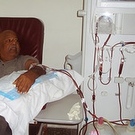Articles tagged with: Kidney Failure
News»

The results of a recent Phase 2 trial indicate that Velcade-doxorubicin-dexamethasone treatment can reverse multiple myeloma-associated kidney damage in myeloma patients suffering from kidney failure. The regimen also improved patients’ disease statuses and was associated with few severe side effects.
Multiple myeloma affects plasma cells, a subset of white blood cells that fight infections by producing antibody. In multiple myeloma patients, cancerous plasma cells produce one kind of abnormal antibody.
In some myeloma patients, this abnormal antibody binds to a protein produced in the kidney. These antibody-protein complexes then accumulate in the …
News»

A recent study found the combination therapy of thalidomide (Thalomid) and dexamethasone (Decadron), commonly referred to as TD, to be safe and effective as induction therapy in newly diagnosed multiple myeloma patients with impaired kidney function. The study authors also found that 55 percent of participants achieved normal kidney function after TD treatment. The study results were published in the journal Biology of Blood and Marrow Transplantation.
Impaired kidney function is a serious complication that occurs in approximately 20 to 30 percent of myeloma patients at diagnosis and in more …
News»

The findings of a recent study indicate that the combination regimen of Revlimid (lenalidomide) and dexamethasone (Decadron) is effective and safe in multiple myeloma patients with reduced kidney function and may even improve kidney function in some patients when the Revlimid dosage is adjusted according to kidney function. The study was published in the European Journal of Haematology.
Because of its effectiveness, the combination of Revlimid and dexamethasone (RD) has become a standard treatment option for patients with relapsed or refractory myeloma. However because Revlimid cannot be broken down …
News»

The results from a new study indicate that treatment of newly diagnosed multiple myeloma with novel therapeutic agents improves kidney function in most patients, in comparison to treatment with conventional chemotherapy and a high-dose regimen of dexamethasone (Decadron). The authors of the study presented the results of the clinical trial on December 8 at the 51st American Society of Hematology (ASH) Annual Meeting and Exposition.
Multiple myeloma patients commonly experience complications with kidney function, and kidney impairment is associated with increased mortality rates. The Myeloma Beacon recently published a series …
News»

Carfilzomib, which is a proteasome inhibitor under development as a treatment for multiple myeloma, has recently been shown to be a safe and effective treatment for myeloma patients with kidney failure, chromosomal abnormalities, or peripheral neuropathy. These results will be presented at the 51st American Society of Hematology (ASH) Annual Meeting and Exposition in New Orleans December 5 through 8.
Additionally, ASH presenters will examine the effects of carfilzomib in patients who have previously been treated with Velcade (bortezomib) and in patients who are receiving carfilzomib in combination with Revlimid …
News, Resources»

Research shows that approximately 20 percent of multiple myeloma patients develop kidney failure. Kidney failure occurs as a consequence of elevated calcium levels in the blood or when proteins called light chains are produced in excess - overloading the kidneys with protein.
Normally, the kidneys remove wastes, extra fluids, and minerals from the blood. But when they stop functioning, harmful wastes build up and this can cause other complications such as high blood pressure. Generally, kidney failure can worsen for multiple myeloma patients with fluid depletion, hypercalcemia, infection, nephrotoxic drugs (chemicals …
News, Resources»

For those with multiple myeloma, kidney impairment treatments may become a significant part of their myeloma treatment, affecting their daily lives. These treatments require an amount of time and care that may impact patients’ daily schedules and long-term plans.
Wherever a patient goes for treatment, the health care providers there will make sure his fluid intake is right for his condition. Often, patients will have to stay in a hospital overnight to be monitored and to receive other treatments, which might include certain drugs and intravenous fluids. (For more details on kidney …

